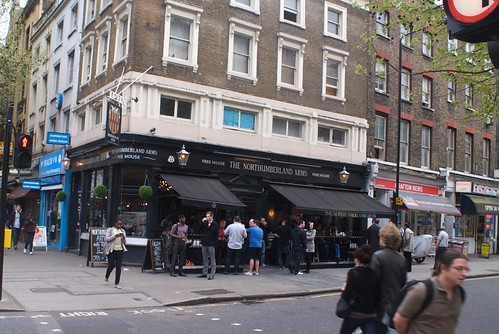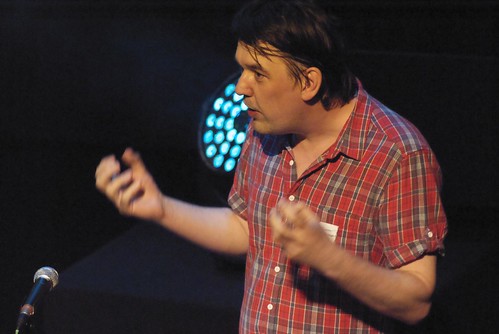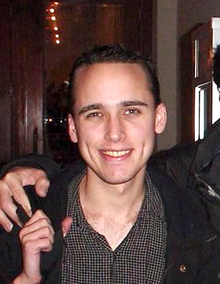
The first thing to note about the Twitter Joke Trial comedy gig was that it was almost the background music to the mother of all "tweet-ups", which had occurred beforehand at the Northumberland Arms pub. This is exactly as it should've been. Up and down the country, people organise these on a regular basis and meet up in pubs and restaurants, to literally find likeminded new friends that they never knew were around the corner if it hadn't been for Twitter. This "tweet-up" was probably bigger than the usual "tweet-up", for two reasons. Firstly, the focus was on the service itself, that many use as a form of free expression which helps them find similar souls in similar tweets. Secondly, Paul Chambers and his girlfriend, Sarah (am I allowed to say her name, it feels like I should keep calling her @crazycolours?) were both to be present. They could drink with their virtual friends and supporters in real life. Paul Chambers, of course, is the man that paid the price of free expression on Twitter, when the police arrested him for his humorous tweet about Robin Hood airport. It was for him, in the first instance, that the comedy gig had been organised. After this pub foray, the crowd moved to the Bloomsbury Theatre, for the comedy gig itself.

Stephen Fry began proceedings in a reflective manner. It set the rest of the night up, because he was keen to point out that it was in everyone's interest to support this campaign for allowing freedom of speech in the digital medium. He got several cheers, particularly when he made his (now widely reported) statement about going to jail for it. This bitterly humourous, languid and sombre start threw Al Murray's entrance into even sharper relief, as he was not just the next act, but the compere for the entire night. It's difficult not to hand Al Murray the entire night on a plate, but as well as his Barman being the blustering engine underneath the entire night and being the connecting force between each act, his own comedy routine was rousing and got a real feeling of audience participation going. This was perhaps the most important thing. Being as Twitter's main appeal is all about everyone being in the mix and anyone getting a chance to shine in the light, Al Murray ended up being an important anchor to the whole show. Al Murray introduced Susan Calman, who kicked off the event in context by mentioning her own legal training. Her icily Glaswegian demeanour foreshadowed David Allen Green’s speech; namely, that lawyers and the legal profession just don’t know what they’re talking about sometimes and get it dreadfully wrong.
For the rest of the night, we then got punched several times in the laughter bones, with no letting up. I make no secret of the fact I was retching with laughter at times. My own personal King of the night was easily Gary Delaney. He went about delivering a series of one-liner puns, laced with cyanide, like a dark Tim Vine or a hyperactive Steve Wright. Jack Whitehall came across at his best in this environment too. By that, I mean he came across as the sullen posh kid who discovered he’s funny and decided to leave the public school dormitory and entertain a wider audience with ascerbic and uncensored observations. Stephen Grant, like his colourful shirt and bright white suit, projected his sunny demeanour into the Bloomsbury Theatre and elevated life into a hazily amusing and warm memory. In sharp contrast, Katy Brand practically assaulted the stage, as she emerged from the audience in army camouflage fatigues and with bomb sirens whirring around her. She then played the role of a genuinely unsettling army soldier who harangued the audience and unwittingly showed what would’ve happened if Lynndie England had branched out into comedy (and had been funny).

With more playful japes to go, Rufus Hound provided one of the first genuine highlights of the night. A slightly bogged-down routine about men liking their cocks sucked was kick-started into hyperdrive as he played his radio show rant at Edwina Currie. Hound's audio clip boiled down the arguments of cynical Twitter Joke Trial campaign commentators, by pointing out the inaccuracies, ignorances and misperceptions of observers like Currie. It was also howlingly hilarious to hear Rufus Hound repeatedly (and correctly) telling her that she was wrong. Most people who are aware of Currie's contributions to discussion shows knows she talks frequently in a misinformed and rude manner anyway.
Robert Popper popped up (sorry, he's probably had that before) and his gentle comic musings were another way of reminding us that free expression involves funny stuff beyond the stage and traditional media outlets. He played a video clip of a phone-in show, where his alter ego Robin Cooper called up and bizarrely complimented a man's singing, before attempting to sing his own self-written ridiculous melody and lyrics. I wasn't certain how the audience were going to react to Popper's routine, as I knew it'd be 'oddball' compared to the more traditional stand-up that had occurred. However, the laughter was loud, particularly at the reactions of the hosts of the radio show (i.e. totally baffled and non-plussed). David Schneider's performance disgraced all of us who have hit a certain age by being disgustingly full of energy and left us with two highlights of the evening. Firstly, he gave his demonstration of premature ejaculation with an audience member (@krunchie_frog, who also very nearly upstaged him). Secondly, he followed this up with his multiple-dance-routines-morphed-into-one. It really needed to be seen to be believed, but it astounded and amused the crowd in equal measures.

The night closed with Graham Linehan, the man who can be credited with organising a fair chunk of the evening. He guides us through a pile of rubbish. By that, I mean his routine is literally about rubbish. It's about the delightful detritus, debris and random odds-and-sods that litter the web. It's the comedy and stream-of-consciousness funniness that can't fit into a television sitcom, sketch show or stand-up comedy and it's no poorer for being the oddball in the room. The D.I.Y. approach of these little internet demigods also underlines what Graham was excited about, namely that the comedy is generated from people sitting at home and they are not necessarily from the pens of professional comedy writers like him (one of my favourites was the "ugly furniture" advert, that someone threw together by gleefully re-editing a real commercial). It was a fitting end and tribute to what the gig was all about, which is the creative freedom to mix, match and marvel within the magnificent digital revolution that social networking is all about.

Graham's act perfectly bookended the night with Stephen Fry's at the beginning. It also acted as a balancing act with the core of seriousness provided by Paul Chambers' lawyer, David Allen Green. David is best known for his "Jack Of Kent" blog, where he disseminates British law in a rigorous and skeptical fashion. The blog has attracted a big following and it's easy to see why, as David spoke to the Twitter Joke Trial audience. His softly-spoken delivery had the crowd entranced, as he gave the reasons for Paul Chambers predicament and why he disagreed with them vehemently. His quote that the Twitter Joke Trial "does not make me proud to be an officer of the court" spoke volumes. If David Allen Green hadn't left the stage so quickly, the standing ovation that had started rippling out throughout the audience (that had eluded all the other talented comedians) would've been allowed to have hit a deserving crescendo. It is to him and Paul Chambers that this gig was ultimately for. The gig, and its attending "tweet up", was a glorious occasion.
Photographs by @gingernuts at his Flicker stream. Please visit it here.





